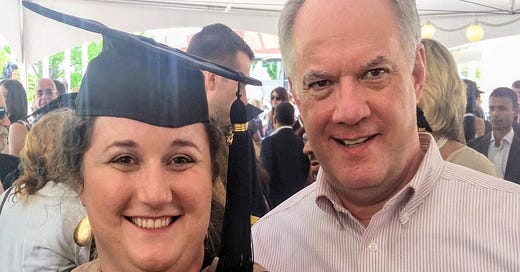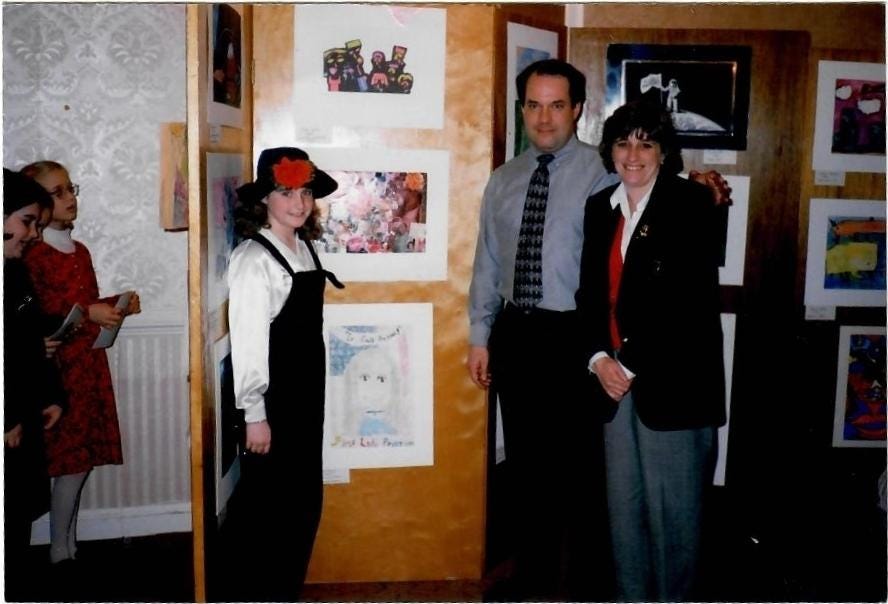A Catholic deacon's daughter died by suicide. Then he started a global Catholic mental health ministry.
"She died by suicide but she was not defined by that. She was a beautiful child made in the image and likeness of God."

By Gary Gately
As soon as police arrived at his door that terrible night in August 2016, Deacon Ed Shoener knew: The bipolar disorder that had shadowed his daughter Katie for more than a decade — and led to her suicide attempt as a high school senior –– had finally claimed her.
Hours later, Shoener wrote a short but eloquent obituary he figured would reach mainly residents of his hometown of Scranton, Pennsylvania.
God had other ideas, he realizes now.
The obit, first published in The Times-Tribune of Scranton, went viral, picked up by, among others, The Washington Post.
Millions of people read it, and tens of thousands of people from across the world contacted Shoener.
Some of them had lost loved ones to suicide. Others suffered from a mental illness or struggled to help loved ones or friends who did. Many thanked him for helping reduce the stigma surrounding mental illness and suicide and offered prayers for Katie, who died by suicide at age 29, and her family.
Again and again, Shoener heard from people who lamented that the Catholic Church offered little to minister to those suffering from mental illness and their loved ones.
That’s when he had an epiphany that he’s now convinced came from God.
“I was shocked by the response to the obituary,” Shoener tells The Catholic Observer. “I often say I never had any vision of Mary or any sort of great mystical experience that you hear about that some people have had, but I felt that the response to Katie’s obituary was God’s way of hitting me over the head with a 2-by-4 to get involved in ministering to those with mental illness.”
He quickly established a mental health ministry at his parish, the Cathedral of Saint Peter in Scranton, then cofounded the nonprofit Association of Catholic Mental Health Ministers (ACMHM), for which he now serves as president.
The Scranton-based organization helps parishes throughout the world establish mental health ministries. They seek to reach out to mentally ill people, to see Christ in them and get beyond stigma and shame, welcome and comfort them and treat them as precious children of God, not people defined by their mental illnesses.
Already, the ACMHM, founded in 2019, now counts members in 40 U.S. states and more than 60 foreign countries, including Canada, India, South Africa and Uganda.
“I’m convinced that this is the work of the Holy Spirit because I’m not smart enough to expand a ministry across the globe,” says Shoener, 69. “I’m not that kind of strategic planner or thinker. So it’s definitely the work of the Holy Spirit.”
Shoener hopes parish mental health ministries become as common as youth, prayer or grief ministries worldwide.
The association’s website offers a host of resources on starting the ministries, including free online courses, liturgy, webinars and videos for clergy and lay people, as well as links to spiritual support groups and other mental health organizations and information on mental illnesses, addiction, grief and suicide. Shoener stresses, however, that the mental health ministries provide spiritual support, not diagnoses, though they may help people living with a mental illness find treatment and medical services in their communities.
A new American Psychiatric Association poll confirms the need to reduce stigma surrounding mental illness in faith communities. The poll found that while 60% of U.S. adults say their faith or spirituality is an important factor in supporting their mental wellness, only 52% of those who belong to a religious community agree that their faith community "discusses mental health openly and without stigma."
“We had no reason to think she was struggling like that.”
Too often, Shoener says, those struggling with mental illnesses suffer in silence and secrecy.
His daughter Katie had been among them.
Neither Shoener nor his wife, Ruth, had any idea Katie had been suffering from a mental illness until she attempted suicide by swallowing a handful of pills, when the couple was on a trip during her senior year in high school.
The call from a Scranton hospital informing Shoener of the attempt stunned him and his wife.
“It came right out of the blue,” he says. “We had no reason to think she was struggling like that. Everything seemed fine on the surface. It was the first time that we realized Katie was struggling with mental health issues.”
Nobody who knew Katie then would have suspected that she suffered from a mental illness. The gregarious girl with lots of friends had been one of the top students in her high school class at Scranton High School, president of her school’s National Honors Society chapter and a star on the school’s soccer team.
Soon after her suicide attempt, the couple learned that Katie had been suffering from bipolar disorder and cutting to relieve the stress of her mental illness, then hiding her scars with bracelets.
Word of Katie’s suicide attempt spread quickly through the small town of Scranton. But many did not know how to respond.
“When she went back to school, it was all hush-hush because of the stigma surrounding mental illness and suicide,” Shoener says. “At first, we didn’t even know how to process it, and among others, there was this stigma about it. As you can imagine, many people didn’t know what to say. They were uncomfortable talking about suicide and mental illness so they just said, ‘I’m sorry,’ and that was the end of it. For many people, it’s easier just to avoid the subject and any real discussion about it. There’s such fear around these illnesses.”
Had Katie been injured in an auto accident or seriously ill, he says: “Everybody would have been at the house and bringing casseroles, but I’ve come to learn mental illness is not a casserole illness. People do not bring casseroles over when your child has attempted suicide or been admitted to a mental hospital.”

Shoener says Katie was not defined by her bipolar disorder.
As he wrote in the obit: “So often people who have a mental illness are known as their illness. People say that ‘she is bipolar’ or ‘he is schizophrenic.’ Over the coming days as you talk to people about this, please do not use that phrase. People who have cancer are not cancer, those with diabetes are not diabetes. Katie was not bipolar — she had an illness called bipolar disorder — Katie herself was a beautiful child of God.”
After the first suicide attempt, Katie fought valiantly to overcome her illness. She saw a therapist weekly and a psychiatrist regularly and took all her medications. She also checked herself into psychiatric hospitals for inpatient stays when the depression sapped the joy from her life.
“She took it seriously,” Shoener says. “She was not in denial about having a mental illness, and she tried to manage it well, and we did too as her parents.”
Katie went on to graduate with a bachelor’s degree in business from Penn State University and earned an MBA from Ohio State University. She took a job in the human relations department of a company in Ohio, where she lived with her dog. (Katie would joke to her Catholic deacon dad that he would be proud of her for naming the dog “Mary.”)
But she left the job during a serious episode of depression. Her parents — worried about her being isolated and alone, haunted by the feelings of hopelessness that accompany clinical depression — urged her to move back to Scranton. But she told them that would make her feel as though she had failed.
Toward the end of her life, she had planned to move to San Diego to live near her brother Rob, and Shoener says she seemed upbeat.
Then on the night of Wednesday, August 3, 2016, Katie ended her life as she sat in her car in the parking lot of her apartment complex in Lewis Center, Ohio, about 20 miles north of Columbus.
She left only a brief note: “This life is not for me. Take care of Mary.”
“I know Katie didn’t want to die by suicide,” Shoener says. “She was afraid of that impulse. I am sure her suicide on that day was an impulsive irrational moment. She died by suicide but she was not defined by that. She was a beautiful child made in the image and likeness of God.
“I don’t think anybody who dies by suicide wants to die by suicide when they’re well. In fact, I know many people who have attempted suicide, and every single person, once they’re well, and once they’re stable, they say, ‘I’m so glad I didn’t die. Thank God I didn’t die.’ But the impulse to die by suicide just becomes overwhelming, and it becomes irrational. People think it’s the best thing to do. They think it will be the best thing for them, it will be the best thing for their family, the best thing for all of their friends, and they just don’t want to be here. They’re just trying to escape the pain.”

Shoener expresses frustration with mental healthcare, partly due to the limitations of diagnosing and treating mental disorders effectively.
“I used to think, ‘Well, jeepers, you go to the hospital and they take her in after she’s feeling very depressed and they wouldn’t release her until the depression was under control.’ But that’s not the way it works,” he says. “I think a lot of people who don’t experience the mental healthcare system don’t realize that. If you’re feeling suicidal, they’ll say, ‘Well, try this medicine and come back if you still want to kill yourself.’ That’s how it goes.”
Still, Shoener strongly urges those with mental illness to seek treatment -– and says Katie probably lived 10 more years than she would have without treatment.
“These diseases can strike anybody.”
Shoener cites sobering statistics: Roughly 1 in 5 Americans have a mental illness at any given time, and about half will have one in their lifetime. Over 49,000 Americans died by suicide in 2022, an average of one every 11 minutes, according to the U.S. Centers for Disease Control and Prevention, and suicides have soared among young people in recent years.
For those with bipolar, statistics vary, but research has shown that 30%-60% of the estimated 6 million Americans with the disorder attempt suicide at least once.
“These diseases can strike anybody,” says Shoener, the father of three surviving children and eight grandchildren. “Nobody gets a pass on these illnesses. They affect everybody. It’s not like it’s them and us. If you don’t experience a mental illness yourself, you know or love someone who does.”
But, he says: “There’s still a pretty significant stigma. Even in religious circles, there are still some people still sometimes the sense of over-spiritualizing these things and somehow suggesting that depression, bipolar or psychosis could go away if you had more faith or prayed more or that it’s a result of a character flaw or moral failing.”

Donna Nebistinsky, pastoral associate at Saint Elizabeth Ann Seton parish in Mechanicsburg, Pennsylvania, started a mental health ministry at her parish two years ago, with the help of Shoener and the ACMHM. It became the first mental health ministry in the Diocese of Harrisburg, and it has since helped expand the ministries to other parishes and diocese-wide efforts in response to mental health needs.
Nebistinsky says she’s acutely aware of the need to provide spiritual guidance and support to mental illness sufferers: Several of her adult children and in-laws struggle with depression, anxiety, panic attacks or suicidal ideation, and two children and a young adult in her area alone have recently died by suicide.
So often, she says, those with mental illness feel all alone in their struggles.
“We decided this ministry was something very important to us for those with mental health diagnoses and those close to them — parents, other family members and friends,” Nebistinsky tells The Catholic Observer.
“We are not therapists; we are fellow Catholics who accompany each other and help dispel the stigma of mental illness,” she explains. “We pray together and help each other connect to a life of faith and health of body, mind and spirit. We’ve become like a nice little family. It’s just been a beautiful gift.”
For example, in 1994, Saint Pope John Paul II revised the Catechism of the Catholic Church to read: “Grave psychological disturbances, anguish or grave fear of hardship, suffering or torture can diminish the responsibility of the one committing suicide. We should not despair of the eternal salvation of persons who have taken their own lives.”
Until the 1960s, the Church had denied Catholic funerals and burials in Catholic cemeteries to those who ended their lives by suicide.
Today, however, Archbishop Vincenzo Paglia, president of the Vatican’s Pontifical Academy for Life, told The Catholic Observer in an email: “Suicide is the emerging tip of a deeper malaise. In its mission to listen, welcome, forgive, and care for all who suffer, the Church has undoubtedly overcome its past rigidity, for example, when it denied funerals in case of suicide. The life of a person who decides to take his or her own life does not coincide with his or her last tragic gesture.”
And Pope Francis has been at the forefront in stressing the need for the Church to welcome those suffering from mental illnesses as children of God.
The 87-year-old Jesuit pontiff, who has been candid about receiving treatment for his own anxiety as a younger priest, said in a video on his Worldwide Prayer Network in 2021 that we must “accompany” those suffering mental illnesses and work to “fully overcome the stigma that mental illness is often tainted with.”
Shoner attended the Vatican’s first mental health conference in January 2024, which drew participants from throughout the world, and gave the pope a copy of his 2020 book “When a Loved One Dies by Suicide,” one of two he edited with Bishop John Dolan of the Diocese of Phoenix, who lost three siblings to suicide and serves as ACMHM’s chaplain. (The other book they co-edited is “Responding to Suicide: A Pastoral Handbook for Catholic Leaders,” also published in 2020.)
Says Shoener: “I am absolutely convinced that God wants to be present in the lives of people facing these challenges and living with these illnesses. It would be wonderful if the Church became the place you go if you suffer mental grief or are close to someone who does. The Church is ready for this.”
He says those who suffer mental illness, along with those who have lost a loved one to suicide, have so much to offer the Church by sharing God’s love with those who bear these crosses through their empathy, understanding and support.
Shoener says he has no doubt that Katie is still with him and accompanying him in his mental health ministry.
“I pray to Katie and for her regularly,” he says. “So in that sense, I’m in communion with her. It’s a prayer that God guides me, doesn’t let me stray far from God, and that he shows me how to get the most out of this ministry. That’s what I pray for.”
If you or someone you know is contemplating suicide or in crisis, call or text 988 for the 988 Suicide & Crisis Lifeline or chat live at 988lifeline.org.



